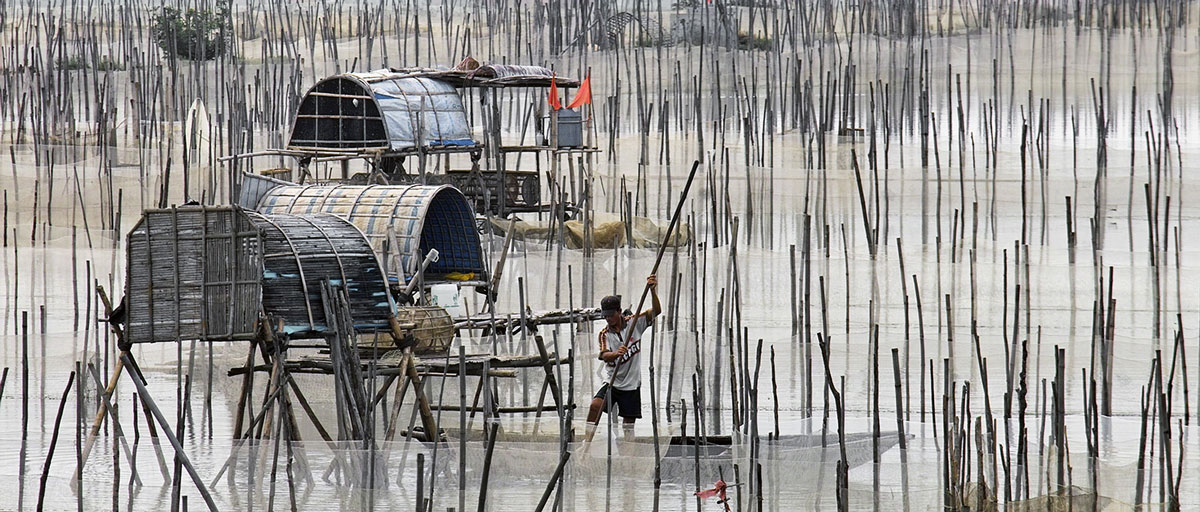
A new study shows that environmental deterioration have left fishing communities in central Vietnam in a perpetual social-ecological trap. Photo: Hoang The Nhiem
Social-ecological traps
Damned if they do, damned if they don’t
Adaptation to environmental change is not straightforward, struggling fishing communities in Vietnam show why
- Study looks at how how fishing communities in the Tam Giang Lagoon in central Vietnam have
dealt with challenges like climate change, floods, population
growth and urbanization - Responses to crises is communities keep doing what they have always done
- Participants in the study describe a vicious circle and poverty traps
Responding to climate change is good but not all responses are great. The term "adaptation", understood as adjustments in behaviour to either mitigate harm or exploit opportunities emerging from climate change, features prominently in scientific analyses and policy papers.
But it comes with a variety of challenges. One important one is the assumption that adaptation by default leads to something better.
The reality can be much different.
Keep doing what they have always done
In a study published in Environment, Development and Sustainability, centre researcher Wijnand Boonstra together with Tong Thi Hai Hanh from Uppsala University have looked at how fishing communities in the Tam Giang Lagoon in central Vietnam have dealt with a variety of challenges. Climate change, floods, population growth and urbanization are some of them.
Boonstra and Hanh focused on two villages in the Quang Phuoc commune, Phuoc Lap and Mai Duong. The first village depends significantly on fishing and low-input aquaculture and the second on rice production and aquaculture.
Common for both villages is the exposure to ever more frequent storms and floods. Through a mixed-method approach consisting of questionnaires, semi-structured interviews and focus groups, Boonstra and Hanh found that despite attempts at diversifying their fishing methods, the end result is that they keep doing what they have always done. This in turn leads to declining fish stocks and frequent harvest failures in aquaculture.
Deteriorating conditions
The responses to this deterioration have led Boonstra and Hanh to conclude that the fishers and the fish farmers are caught in a social-ecological trap.
"Fishers primarily try to maintain their catches by increasing fishing intensity or diversifying their catching methods. This response then results in overfishing and a further decline in fish stocks. Combined, this is how the social-ecological trap comes to exist."
Similarly, fish and shrimp farmers have continued to invest in aquaculture despite diseases and declining yields. This in turn has left them with increasing debts but with slim prospects for a return on their investments.
Nevertheless, they continue with aquaculture. They have no choice, they say.
"We have to continue to farm fish with the expectation that we will get some profit to clear the big debt and to get returns on our investments. We cannot leave them [the ponds] empty"
Fish and shrimp farmer interview in the study
A complicated interaction
Based on their work in Vietnam, Boonstra and Tong Thi Hai Hanh argue that traps are the result of a complex interaction between environmental change and human responses.
Participants in their study describe a vicious circle whereby changes in the yearly storms and floods lead to declines in fish catches and loss of yields in aquaculture.
Most households tried to make up for the losses by diversifying their fish catching methods or by intensifying aquaculture.
However, both responses only further deteriorated the ecological conditions of the lagoon. Based on this, Boonstra and Tong Thi Hai Hanh conclude that the idea of traps is useful to point out responses that are maladaptive.
"Our research nevertheless also shows that there is always space, however small, for human agency and creativity to overcome traps. An important question for future research is to explain the conditions that lead to rigid or creative responses."
RELATED INFO
Boonstra, W.J. & Tong Thi Hai Hanh. 2015. Adaptation to climate change as social-ecological trap - A case study of fishing and aquaculture in the Tam Giang Lagoon, Vietnam. Environment, Development and Sustainability 17 (6): 1527-1544
Wijnand Boonstra is particularly interested in understanding how individual use of ecosystems aggregates to form so-called regimes of ecosystem use. Describing and explaining the complex set of social and ecological conditions and their interaction at micro and macro scales that cause these regimes to shift, is a key research objective.
Visiting address: Albanovägen 28. Disability entrance: Albanovägen 18
Deliveries: Roslagsvägen 28
Postal address (courier packages):
Stockholms Universitet
Stockholm Resilience Center
[Recipient]
Frescativägen 8
114 18 Stockholm
Sweden
Postal address (letters):
Stockholms Universitet
Stockholm Resilience Center
[Recipient]
Frescativägen 8
SE-106 91 Stockholm
Sweden
Phone: +46 8 674 70 70
Organisation number: 202100-3062
VAT No: SE202100306201






